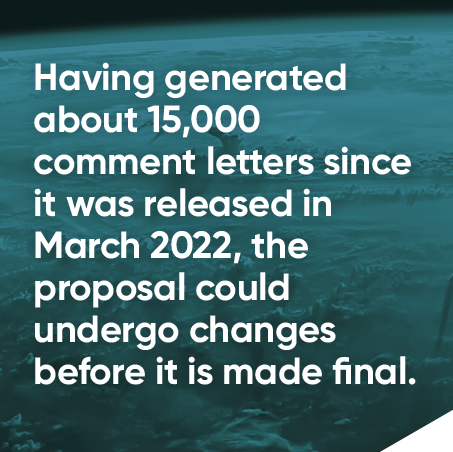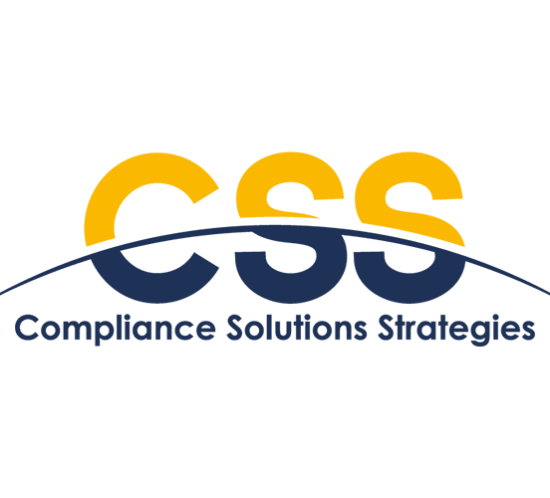Reopening of comment period for position reporting of large SBSs (proposed new Rule 10B-1)
The SEC has recently reopened the comment period for position reporting of large Security-Based Swap (“SBSs”) positions (proposed new Rule 10B-1). In addition, the SEC’s Division of Economic and Risk Analysis released a memorandum which contains supplemental data and analysis regarding the proposed reporting thresholds in the equity security-based swap market.
The public comment period will remain open until Aug. 21, 2023, or until 30 days after the date of publication of the reopening release in the Federal Register, whichever is later.
The proposed new Rule 10B-1: https://www.sec.gov/rules/final/2023/34-97656.pdf &
the memorandum: https://www.sec.gov/comments/s7-32-10/s73210-207819-419422.pdf.
As pressures mount, SEC finalizing its rule for companies’ climate-related disclosures
Global scientific consensus and domestic political interests compete for its attention
The SEC’s forthcoming Final Rule, requiring climate-related disclosures by US companies, is placed here in the context of recent global climate developments. This provides some perspective on the pressures faced by the SEC, as it finalizes its much talked-about 490-page proposal. We conclude with some important action items for investment firms, who will rely on these disclosures for their sustainability investment analyses and compliance functions.
Contents
1. Latest global climate assessment
2. ISSB reporting standards
3. SEC proposal
4. SEC authority
5. SEC proposals for investment firms
6. Takeaways for investment firms
1. Latest global climate assessment
In March the IPCC (Intergovernmental Panel on Climate Change), the UN’s body for assessing the science related to climate change, produced its Sixth Assessment Report. It constitutes yet another alarming climate change forecast for the world, backed by scientific data. Among the many assessments the IPCC made (most of them with “high confidence”), the following ones highlight the importance of addressing the crisis as soon as possible, including through the power of financial capital:
- “Human activities, principally through emissions of greenhouse gases, have unequivocally caused global warming”, due to ongoing “unsustainable energy use, land use and land-use change, lifestyles and patterns of consumption and production . . .”
- “Every increment of global warming will intensify multiple and concurrent hazards. Deep, rapid, and sustained reductions in greenhouse gas emissions would lead to a discernible slowdown in global warming within around two decades, and also to discernible changes in atmospheric composition within a few years.”
- “Delayed mitigation and adaptation action would lock-in high-emissions infrastructure, raise risks of stranded assets and cost-escalation, reduce feasibility, and increase losses and damages.”
- Global financial flows currently are insufficient for mitigation of climate change, to achieve the Paris Agreement goal of preventing a global temperature increase of 1.5 °C above pre-industrial levels.
- Global financial flows currently are insufficient for adaptation to climate change.
- “If climate goals are to be achieved, both adaptation and mitigation financing would need to increase many-fold. There is sufficient global capital to close the global investment gaps but there are barriers to redirect capital to climate action . . .”
Such imperatives are currently acknowledged in the US at a federal level, under the Biden Administration’s broad climate change policy goals. (From its first day when it rejoined the Paris Agreement, to its more recent statement on federal budgeting for the climate crisis.) It remains to be seen, of course, whether that Administration, or one with similar climate change goals, succeeds in the 2024 Presidential election. If it does not, these policies — and their attendant agency initiatives such as the SEC’s climate-related disclosure proposals — may be significantly curtailed.
2. ISSB reporting standards
About two weeks before the IPCC’s report, an incremental next step was taken in global efforts to establish common sustainability reporting standards. The ISSB (International Sustainability Standards Board) announced that its Sustainability Disclosure Standards will become effective for annual reporting periods starting on 1 January 2024. Stakeholders and the public recently gained access to the Standards (labeled “S1” and “S2”) in June 2023, when the ISSB published them. Summing up the goal of common global standards, ISSB Chair Emmanuel Faber stated, “We responded to capital market and G20 demand for a common language of investor focused sustainability-related disclosure, working diligently to deliver standards that fulfil the global baseline.”
Both the ISSB and the SEC used the recommendations of the TCFD (Task Force on Climate-related Financial Disclosures) as a foundation for their proposed disclosure requirements . Yet the SEC proposal has faced pressures to keep up with the ISSB standards, particularly with respect to disclosure of Scope 3 emissions.
3. SEC proposal
Against this global backdrop, the SEC is finalizing its proposal that will require American public companies (and certain foreign private issuers) to disclose climate-related information and metrics in their annual reports and registration statements. (Details on the proposal including the relevant disclosure filings can be found here.)
Having generated about 15,000 comment letters since it was released in March 2022, the proposal could undergo changes before it is made final. While The SEC initially targeted April of 2023 for its adoption of a Final Rule, this has been delayed until later in 2023 (given the time needed for it to digest the voluminous public comments, as well as the possibility of legal challenges, and then decide on its path forward).

Among the changes reportedly contemplated by the SEC is a softening of Scope 3 GHG emissions disclosures. Representing a company’s indirect greenhouse gas emissions through its value chain — both upstream (for example in transport of materials to the company) and downstream (for example investments made by the company, or its transport of goods to customers) — Scope 3 emissions for a company are often far greater in volume than its Scope 1 and 2 emissions, and yet Scope 3 information frequently suffers from a lack of verifiable data. Already in the current version of its proposal, the SEC acknowledges this with some relief: it requires disclosure of Scope 3 emissions one year later than Scopes 1 and 2, and it provides some latitude for incorrect Scope 3 data (which would not be deemed fraudulent if made in good faith with a reasonable basis).
Reports have also suggested that the SEC is considering raising its threshold (currently set at 1%) that triggers a company’s required disclosure of the financial impacts of its climate-related risks, climate-related transitional activities, severe weather and similar events (as a proportion of a total financial line item for a relevant fiscal year).
The SEC’s proposed compliance dates for disclosing climate-related information are also subject to change, especially if the Final Rule is delayed. As it reads currently, the proposal would require the largest companies to begin making disclosures in 2024 (for their fiscal year 2023, assuming a fiscal year-end of 31 December). The SEC qualified its timeline, however, by basing it on an assumption that its Final Rule would take effect in “December 2022”, a date which has now come and gone.
4. SEC authority
Apart from possible alterations to the rule, some of its opponents have questioned the SEC’s authority to promulgate it in the first place. One such line of reasoning is based on the U.S. Supreme Court’s ruling in West Virginia v. EPA, a 2022 decision in which the Court limited the authority of the EPA. A close examination of that case, however, reveals that it could be of limited consequence to the SEC’s authority to require climate-related disclosures.
For one, the much-discussed “major questions” doctrine introduced by the West Virginia Court – requiring federal agencies to find clear Congressional authorization when their powers involve “extraordinary cases” of “economic and political significance” – very possibly may not apply to SEC climate disclosure requirements. West Virginia took on the EPA’s power to enact a system under its “Clean Power Plan”, which would essentially have required many energy producers to shift their power generation to more environmentally friendly energy sources. The Court labeled the EPA’s proposed authority to do so a “major question”, noting the EPA’s own modeling which pointed to billions of dollars in compliance costs, the closing of dozens of coal-fired plants, and the elimination of tens of thousands of jobs.
By contrast, the SEC’s climate disclosure proposal mandates no such action, or anything close to it, but rather it requires companies to tell the public about their direct and indirect emissions and other climate-related information. While a common thread among these situations could be seen in compliance costs they would generate for the affected parties, the similarities between these cases essentially end there.
Second, the particular line drawn by the West Virginia holding far from suggests that it would extend to the SEC’s climate disclosure rule. The Supreme Court expressly declined to restrict the EPA’s authority any more broadly than the factual scenario before it, stating that it was answering only the narrow question of whether the EPA’s particular approach under its Clean Power Plan was authorized by Congress under a specific provision of the Clean Air Act. (That provision being Sec. 111(d), and the Court’s answer being “No” in a 6-3 majority led by Chief Justice Roberts.)
It seems unlikely, therefore, that courts would throw out the SEC’s rule based on West Virginia.
But some observers view that case as a proverbial canary in a coal mine, that suggests the Supreme Court’s willingness to limit federal agency powers more generally. For the SEC, that could play out as court skepticism of the SEC’s power to require disclosures that are not considered “material” to a company’s financial returns. (In the initial vote by SEC Commissioners putting forth the proposal, Commissioner Hester Peirce dissented largely for that reason, but was outvoted 3-1 and so the proposal went ahead.)
5. SEC proposals for investment firms
The SEC’s rulemaking agenda includes other ESG proposals as well. Notably for investment advisors and funds, October 2023 is the SEC’s target date for finalizing a proposal that would require them to disclose ESG information in fund prospectuses, annual reports, investment advisor brochures, and regulatory filings such as Form N-CEN and Form ADV. (Details, including compliance dates and how each reporting document would be affected, can be found here.)
That same month is also targeted by the SEC for finalization of its “Names Rule” proposal. This would expand the scope of terms, used in a fund name, that require the fund to invest least 80% of its assets in a manner suggested by the fund name (terms such as “growth”, “value”, and ESG-related terms would be added).
These proposals currently can serve as a guide to what investment firms should be addressing in their compliance, operations and marketing departments. By the end of 2023 they should have even more certainty, assuming that the Final Rules are in place.
6. Takeaways for investment firms
As the SEC finalizes its climate-related disclosure requirements for issuers, the lesson for investment firms is to be prepared. This could entail the following measures:
- Data. Prepare systems, whether in-house or outsourced, for ingestion of corporate climate-related data. For example:
- GHG emissions (Scopes 1, 2 and 3)
- TCFD recommendations (upon which many global ESG frameworks are based)
- ISSB reporting standards (which are being finalized and will affect corporate ESG data)
- Automation / analytics. Enable systems to efficiently transform that data into actionable knowledge.
- Robust analytics, for climate-related data coming from investee companies, will not only enable effective compliance, but can provide important marketing and product advantages for an investment firm.
- Expertise. Tap dedicated ESG experts, from both a data and compliance perspective, including at management level.
- ESG data, ESG requirements and ESG opportunities have arrived, and will not disappear regardless of political or investment climate.
- Budget. Budget accordingly, as an investment in remaining competitive.
Investment firms may find it prudent to take these steps, regardless of the SEC proposal’s ultimate fate. Even if the Final Rule is struck down by courts, firms will see competitive advantages in having ESG-ready capabilities. The demand for ESG data, and the capacity to analyze it, will only expand as global consensus settles on sustainability as the necessary path forward.
Contact us to learn more.
1 IPCC, “AR6 Synthesis Report”, at https://www.ipcc.ch/report/ar6/syr/, presented at IPCC-58 (13-17 March).
2 See IPCC, “Headline Statements”, at https://www.ipcc.ch/report/ar6/syr/resources/spm-headline-statements/
3 Such an increase would increase risks to health, livelihoods, food security, water supply, human security, and economic growth. IPCC, “Special Report: Global Warming of 1.5 °C”, Headline Statements from the Summary for Policymakers, at https://www.ipcc.ch/site/assets/uploads/sites/2/2019/06/SR15_Headline-statements.pdf.
4 The White House, “FACT SHEET: President Biden Sets 2030 Greenhouse Gas Pollution Reduction Target Aimed at Creating Good-Paying Union Jobs and Securing U.S. Leadership on Clean Energy Technologies” (22 April 2021), at https://www.whitehouse.gov/briefing-room/statements-releases/2021/04/22/fact-sheet-president-biden-sets-2030-greenhouse-gas-pollution-reduction-target-aimed-at-creating-good-paying-union-jobs-and-securing-u-s-leadership-on-clean-energy-technologies/.
5 The White House, “FACT SHEET: President Biden’s Budget Lowers Energy Costs, Combats the Climate Crisis, and Advances Environmental Justice” (9 March 2023), at https://www.whitehouse.gov/omb/briefing-room/2023/03/09/fact-sheet-president-bidens-budget-lowers-energy-costs-combats-the-climate-crisis-and-advances-environmental-justice/.
6 IFRS, “ISSB ramps up activities to support global implementation ahead of issuing inaugural standards end Q2 2023” (17 Feb 2023), at https://www.ifrs.org/news-and-events/news/2023/02/issb-ramps-up-activities-to-support-global-implementation-ahead-of-issuing-inaugural-standards-end-q2-2023/; IFRS, “General Sustainability-related Disclosures, at https://www.ifrs.org/projects/work-plan/general-sustainability-related-disclosures/.
For more context on the convergence of global sustainability data standards, see Compliance Solutions Strategies, “ESG Update for Investment Firms: The Data Problem and E.U. Response”, at https://cssregtech.com/2022/10/esg-update-for-investment-firms-the-data-problem-and-e-u-response.
7 Thompson Reuters, “SEC Chair Responds to Questions on Potential Lawsuit on Climate Disclosure, Fast Paced Rulemaking” (8 March 2023), at https://tax.thomsonreuters.com/news/sec-chair-responds-to-questions-on-potential-lawsuit-on-climate-disclosure-fast-paced-rulemaking/; TCFD, webinar, “Climate Disclosure Convergence: TCFD, SEC, and ISSB” (May 2022), at https://www.fsb-tcfd.org/videos/ (21:37, 28:00).
8 Thompson Reuters, “SEC Chair Responds to Questions on Potential Lawsuit on Climate Disclosure, Fast Paced Rulemaking” (8 March 2023), at https://tax.thomsonreuters.com/news/sec-chair-responds-to-questions-on-potential-lawsuit-on-climate-disclosure-fast-paced-rulemaking/; TCFD, webinar, “Climate Disclosure Convergence: TCFD, SEC, and ISSB” (May 2022), at https://www.fsb-tcfd.org/videos/ (21:37, 28:00).
9 Politico, “SEC’s Gensler weighs scaling back climate rule as lawsuits loom” (4 Feb 2023), at https://www.politico.com/news/2023/02/04/sec-climate-rule-scale-back-00081181#:~:text=Under%20the%20proposed%20rule%2C%20public,new%20updates%20on%20legal%20issues.
10 Wall Street Journal, “SEC Considers Easing Climate-Disclosure Rules After Investor Pushback” (3 Feb 2023), at https://www.wsj.com/articles/sec-considers-easing-climate-disclosure-rules-after-investor-pushback-11675416111; SEC, Proposed Rule, “The Enhancement and Standardization of Climate-Related Disclosures for Investors” (21 March 2022), II. DISCUSSION, F.2. (pp. 120-121), at https://www.sec.gov/rules/proposed/2022/33-11042.pdf.
11 West Virginia et al. v. Environmental Protection Agency et al., 597 U.S. ___ (2022), at https://www.supremecourt.gov/opinions/21pdf/20-1530_n758.pdf.
12 On 4 January 2023 the SEC released its rulemaking agenda for 2023, confusingly titled “Agency Rule List – Fall 2022”, at https://www.reginfo.gov/public/do/eAgendaMain?operation=OPERATION_GET_AGENCY_RULE_LIST¤tPub=true&agencyCode&showStage=active&agencyCd=3235.
13 See the SEC’s 25 May 2022 press release, and accompanying proposed rule and fact sheet, at https://www.sec.gov/news/press-release/2022-92.
14 See the SEC’s 25 May 2022 press release, and accompanying proposed rule and fact sheet, at https://www.sec.gov/news/press-release/2022-91.
Disclaimer: The information contained in this communication is for informational purposes only. The opinions expressed herein are those of the author and do not necessarily reflect those of Confluence. Confluence is not providing legal, financial, accounting, compliance, or other similar services or advice through this communication. Recipients of this communication are responsible for understanding the regulatory and legal requirements applicable to their business.
Confluence Unveils AI Strategy to Deliver Real Impact for the Investment Management Industry
Meet ‘Rex’: Confluence’s Large Language Model-Based Solution Reconciles Data from Investor Reports in Seconds
Pittsburgh, PA, June 29, 2023 – Confluence Technologies, Inc. (“Confluence”), a global technology solutions provider to the investment management industry, today announced the first development out of its innovation lab that leverages AI technology to solve complex industry problems.
As the first application, the Confluence innovation lab applies Large Language Models (LLM) to solve reconciliation challenges from the SEC’s Tailored Shareholder Reports (TSR). The new tool, Confluence Unity Rex, mines and pinpoints discrepancies in language and numeric information between financial reports and the TSR, delivering significant efficiency and cost savings in the reconciliation process.
Chris Evans, Chief Technology Officer at Confluence, commented:
“Confluence has a long history of solving complex challenges for the investment management industry. Our innovation lab was established to explore use cases for AI and other innovative technologies that deliver real value for our clients. We have several applications in development, including natural language query access to complex datasets, automated data quality assurance and intelligent task automation, and we’ll introduce them to the market in the near future.”
About Confluence Unity Rex
Available for production use in early Fall, Rex automatically parses data from third-party financial reports, interrogates it, and reconciles it against the Tailored Shareholder Reports produced by Confluence.
Todd Moyer, President and Chief Operating Officer at Confluence, commented:
‘This is a breakthrough for fund admins and asset managers who need an answer to increasing compliance complexity and the data reconciliation challenges posed by the TSR. With Rex, we give our clients the ability to use innovative AI technology to lower costs, reduce complexity, and rapidly speed up shareholder report reconciliation. We’ve already shown Rex to many Unity clients and received highly positive feedback.”
With the TSR rule, manual reconciliation is nearly impossible, as firms must do this within a 60-day window. Confluence estimates a typical manager with thousands of share classes and hundreds of data points per class would take a person hundreds of business days to reconcile the reports each time. With Rex, the LLM-enabled reconciliation only takes minutes or even seconds. Confluence Unity Rex also has an interrogatable model which enables clients to ask questions about it to validate and source information.
As the product soon becomes available, clients and prospects can simulate their report reconciliations in a live sandbox environment. To learn more, please contact us.
About Confluence
Confluence is a leading global technology solutions provider committed to helping the investment management industry solve complex data challenges across the front, middle and back offices. From data-driven portfolio analytics to compliance and regulatory solutions, including investment insights and research, Confluence invests in the latest technology to meet the evolving needs of asset managers, asset owners, asset servicers, and asset allocators to provide best-of-breed solutions that deliver maximum scalability, speed and flexibility, while reducing risk and increasing efficiency. Headquartered in Pittsburgh, PA, with 750+ employees in 15 offices across the United Kingdom, Europe, North America, South Africa, and Australia, Confluence services over 1000 clients in more than 40 countries. For more information, visit www.confluence.com.
Confluence Media Contact:
Vanja Lakic
Cognito
confluence@cognitomedia.com
+1 (917) 660-8527
SEC adopted rules related to SBS
Last week, the SEC adopted two new rules related to the security-based swaps (SBS) markets, namely Rule 9j-1 and Rule 15fh-4(c). The former aims at preventing fraud, manipulation, and deception in connection with SBS transactions and the latter at prohibiting undue influence over the Chief Compliance Officer (CCO).
In its Final Rule release, the SEC noted that it is not yet adopting its proposed Rule 10B-1 on the reporting of large SBS positions. The Commission’s work on that rule continues, and could be finalized by the end of 2023.
https://www.sec.gov/rules/final/2023/34-97656.pdf
https://www.sec.gov/news/press-release/2023-104
Confluence chosen by Caisse des Dépôts to manage shareholding disclosures
Confluence solutions to produce cost-efficient, transparent, customizable and compliant reports
Pittsburgh, PA, June 21st, 2023 – Confluence has won public tender issued by Caisse des Dépôts (CDC) to manage shareholder disclosures, streamline operations and produce regulatory forms in an efficient and timely manner of the Asset Management department of State-owned institution.
The confidence placed in Confluence by the 4th largest institutional investor in France is a recognition of Confluence’s regulatory expertise and knowledge of the French jurisdiction (loi Florange), along with best-in-class function coverage and data management, and also the ability to provide high standard data privacy and security.
As the demand for regulatory transparency increases and the filing period simultaneously decreases (within 5 days in Germany for instance), a scalable and automated reporting solution with extended asset class coverage is fundamental to ensuring consistent oversight of risk and quick response to NCA’s expectations. Implementing solutions that can easily accommodate and deliver reporting to clients and governing bodies is essential in today’s marketplace, where timelines are compressed and regulatory mandates frequently change and require ever-more granular analysis.
Tom Pfister, Managing Director, Compliance, Reporting and Services, Confluence comments:
“This is an exciting deal that stands as a testament to the strength of our platform solutions. Caisse des Dépôts can now deliver quality, regulatory-compliant results with speed, scale and efficiency. This comes at a critical moment – in the face of ever-evolving regulations, firms benefit from implementing solutions that deliver accurate reporting to clients and governing bodies.”
Confluence choisi par la Caisse des Dépôts pour opérer la déclaration des franchissements de seuils
Confluence permet la production de rapports clairs, personnalisables et conformes aux réglementations
Paris le 21 juin 2023 – Le groupe Confluence remporte l’appel d’offres public lancé par la Caisse des Dépôts (CDC) pour gérer la déclaration des franchissements de seuils, automatiser les opérations afférentes et produire les différents formulaires réglementaires associés de manière fiable et rapide de la direction des gestions d’actifs de l’Etablissement public.
Pour Confluence, la confiance accordée par le 4ème investisseur institutionnel de France est une reconnaissance de l’expertise réglementaire démontrée par les équipes, dont la maitrise des spécificités françaises en particulier (loi Florange), de la meilleure couverture fonctionnelle du marché, également de la possibilité de fournir un haut degré de confidentialité et de sécurité des données.
Alors que la demande de transparence réglementaire augmente continuellement et que la période de déclaration diminue en parallèle (5 jours en Allemagne par exemple après le franchissement d’un seuil), une solution évolutive avec une couverture étendue des classes d’actifs est fondamentale pour assurer une surveillance cohérente des risques et de réponses associées conformément aux attentes des différents régulateurs nationaux. La mise en œuvre de solutions facilement adaptables et pouvant produire tout type de rapports réglementaires est essentielle dans le contexte actuel, où les délais sont toujours plus réduits et où les exigences réglementaires changent fréquemment, exigeant une analyse toujours plus fine et précise.
Tom Pfister, Managing Director, Compliance, Reporting and Services, Confluence commente :
“Il s’agit d’un partenariat passionnant qui témoigne de la force et la qualité de nos solutions. La Caisse des Dépôts pourra ainsi fournir des résultats de qualité, conformes à la réglementation, avec rapidité, agilité et efficacité. Cela arrive à un moment critique – face à des réglementations en constante évolution, nos clients bénéficient de la mise en œuvre de solutions qui fournissent des rapports précis et conformes à destination de clients finaux et aux organes directeurs.“







